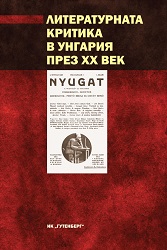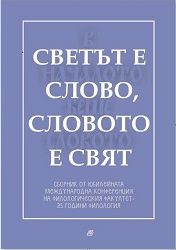
Поетическият език и унгарската поезия от XX век
In this chapter the topic is for the Hungarian poetry and its development reviewed from its place in Hungarian language from 20th century.
More...We kindly inform you that, as long as the subject affiliation of our 300.000+ articles is in progress, you might get unsufficient or no results on your third level or second level search. In this case, please broaden your search criteria.

In this chapter the topic is for the Hungarian poetry and its development reviewed from its place in Hungarian language from 20th century.
More...
This chapter follows the changes of the prefered Hungarian genre of poetry into a novel. In it a relation is being made between the change of the literary taste and the historical changes that took place in Hungary. The author is following the Hungarian novelist Kosztolanyi, who wrote short stories, although the intended literary work to be produced was a novel and although he wrote few novels he stayed as one of the figures that made the poetry-to-novel change.
More...
This chapter is analyzing the poem "With a pure heart" by Attila Jozsef. The author of the article chose this poem because through it reveals very precisely and in details the first work period of the poet, his perspectives and innovative thinking.
More...
The researches about Antal Szerb, in their most, are remembrances and obituaries - related to his tragic end. The beginning of this chapter introduces the reader in the tragic circumstances that led to his death. After the introduction the attention goes to the humanistic position of Antal Szerb and his novel "Journey by moonlight" with analysis of the novel.
More...
In this chapter the novel "The candles burn down to the stump" is being analyzed and more closely which properties of the novel made it possible for its author Marai to gain popularity in the European literature.
More...
This article is about the reforms in Hungarian prose in the late seventies up to the late eighties. The author is reviewing the critic towards the prose genre and the denial of its independence as a genre.
More...
The article deals with new verbal nouns in Bulgarian language, which are formed with the suffix -ne (-не). Observations were made on word formation and lexical semantics of new verbal nouns. Study finds that most of new verbal nouns are motivated by new verbs, but some of them are motivated by names and these verbal names are formed with complex suffixes. The new names with suffixes -tsia (-ция) and -ne (-не) are in competition. Neologisms with suffix -ne and borrowings from English ending in -ing are also in competition. Some of neologisms with suffix -ne appear before the verbs. Most of neologisms with suffix -ne are much more usable than the verbs. Neologisms with suffix -ne are used as terms.
More...
Modern medical discourse reflects the dynamic changes into the Bulgarian speech fortunes. The global world directly reflected in the finest layer of medical terminology international neologiya, and also nominating new concepts and processes. Medical terminology is a layer of lexical fund with its specific features. In the modern stage development medical terms are widely colloquially used in the literary language, in healthcare, in medical practice. New technologies and dynamic economic processes are a prerequisite for the development of linguistic processes and events. Lexical innovation is a constant process, which evolve and enriches the language. Modern medical terminology over the past two decades is constantly filled with many new lexical resources as a result of the development of medical science. These are words and complex terms or phrases which are approved in a specific professional field. At the beginning of the XXI century English managed to become the dominant means of communication between people worldwide. This fact contributes to the entry of words with English origin in medical discourse. At this stage the medical neologiya is an open system of lexical-semantic relationships. Based on the structure of terms, the following basic terminology types are: single words-terms (ednoleksemes) and terms - phrases (polileksemes). In recent years as a result of which the speech is enriched with synonymous funds for communication purposes, there has been active using of new medical neologisms in modern medical discourse.
More...
The paper discusses the textual versions of the prayers for newborn and their mother and the directions to the priest accompanying these prayers in the church rites for the 8th and 40th days after the childbirth in a particular manuscript, Trebnik no. 13 of the mid-15th century housed in Zographou Monastery on Mount Athos. The configuration of prayers and rubrics in this source is similar to those in a group of other South Slavonic Euchologia of the first half of the 15th century, some of which were written on Mount Athos. The author puts forward the hypothesis that this scheme of prayers and rubrics may have appeared on Mount Athos.
More...
One of the specific characteristics concerning the modern development of Bulgarian language is a linguistic cliche - a phenomenon which is unique in its versatility and multi-functionality. This paper comprises selected, analyzed and summarized indicative viewpoints from various forums about cliche, and in particular linguistic cliche. Although a lot of the interpretations are contradictory, they all emphasize certain, often different, parameters and characteristics with regard to the way a cliche functions. Perceived as a multi-meaning and multi-function linguistic phenomenon with a wide range of social and psychological parameters and used in different speech situations and socio-cultural spheres a cliche due to its universality is being universalized. This research is an attempt to explain a linguistic cliche with the help of the specific sociopsychological characteristics of modern communication. The observations on Bulgarian language regarding its place, function, role and the dynamics of its current state give every reason to define a cliche as a linguistic phenomenon.
More...
Megalithic monuments in the world are created in the period V-I mill. BC (in Bulgaria II-I mill. BC). Their original names as well as their functions are unknown today, but the modern times folklore gives them various names trying to explain in a naive manner the fact of their building as well as their purpose. Names of megalithic sites from Bulgaria and other regions in the world are collected and commented here.
More...
Ivan Ignatiev is undoubtedly mysterious figure among futurists. Poet and publisher, author of prose miniatures, journalist, leader of the "Intuitive Association of Ego-futurism", wrote two books - "About theater" (book articles, feuilletons and poems, 1912) and the poetry collection "Scaffold" (1914).
More...
This article deals with the changes in press-language in German daily press during the period from 1988 to 2013. Its goal is to present the most important results of the press-language analysis. It documents changes in stylistic shade, language economy (sentence length) and in the range of vocabulary of foreign origin. An attempt is also made to formulate the development trends of the present language of daily press. The research focused on 55 editions of the most widespread quality newspapers (FAZ, ND-Zeitung) and tabloids (BILD) in Germany. In last chapter author also deals with the GDR-vocabulary with the aim to demonstrate its assimilation into the westgerman language variant.
More...
The present article aims at including lexical items typical for speech activity in Bulgarian and German language, arranging them in thematic fields. Phraseological items from Bulgarian language and their closest German equivalents are basically used. The most important theoretical views concerning linguistic terms language and speech are presented. Brief characteristics of Bulgarian and German verbal world is being presented.
More...
Jacobson was one of the greatest linguists of the 20th century. He was one of the leaders of the Prague Linguistic Circle. Later he became one of the founding members of the Linguistic Circle of New York. He taught at numerous institutions, including Harvard University. He helped to bridge the gap between the European and the American linguistics. He had a profound influence on general linguistics and on Slavic Studies. Also on semiotics, anthropology, ethnology, communication theory, literary studies and theory of translation. His famous classification of translation is part of the intellectual heritage of semiotics and translation theory.
More...
The report examines the main issues related to the preparation of future professionals who will work as translators of feature films, highlights the necessity of teaching the translation of film and video in the masters program at colleges and universities.
More...
The paper is devoted to the particularities of intercultural professional business discourse in teaching Russian as a foreign Language at Bulgarian non-philological universities. The paper analyzes the specificity of the Russian and Bulgarian commercial letters in a contrastive aspect. The commercial letter is noted as a form of epistolary text. The new intercultural approach requires synergy of senses and harmonization of the translation space in the translation process, in particular the translation of dichotomy of emotionality and rationality in Russian and Bulgarian commercial letters in teaching Russian as a foreign in Bulgarian audience.
More...
Modern situation change the state of the language environment.School linguistic space is dependent on these processes. In this paper we present an analysis of the dynamics of some components of the language environment at school tracked the years. We outline the problems that are establishment. We analyze the opportunities to change the status quo.
More...
Kao što je poznato, pismo Divkovićevih izdanja, tako i velikoga Nauka krstjanskoga (VNK), otisnutoga u Veneciji 1611. g, višestruko stoji na razmeđu: uzusa ustavne, minuskulne i brzopisne ćirilice, ali i između uzusa staroslavenske i zapadne (latiničke) grafi je i ortografi je, između oslanjanja na fonologiju onodobnih bosanskih govora i na naslijeđenu staroslavensku praksu itd. Isto tako, Divkovićev VNK stoji i na razmeđu povišenoga i pučkoga, između rukopisa i nove tehnologije, još uvijek između srednjega vijeka i novovjekovlja, doslovce na rubu zapadne i istočne Europe, u kontekstu između latinske i crk venoslavenske tradicije u koji se uglavljuje književnojezični izraz utemeljen na narodnome idiomu.
More...
On the hermeneutic polarity in German philosophy of the twentieth century.
More...